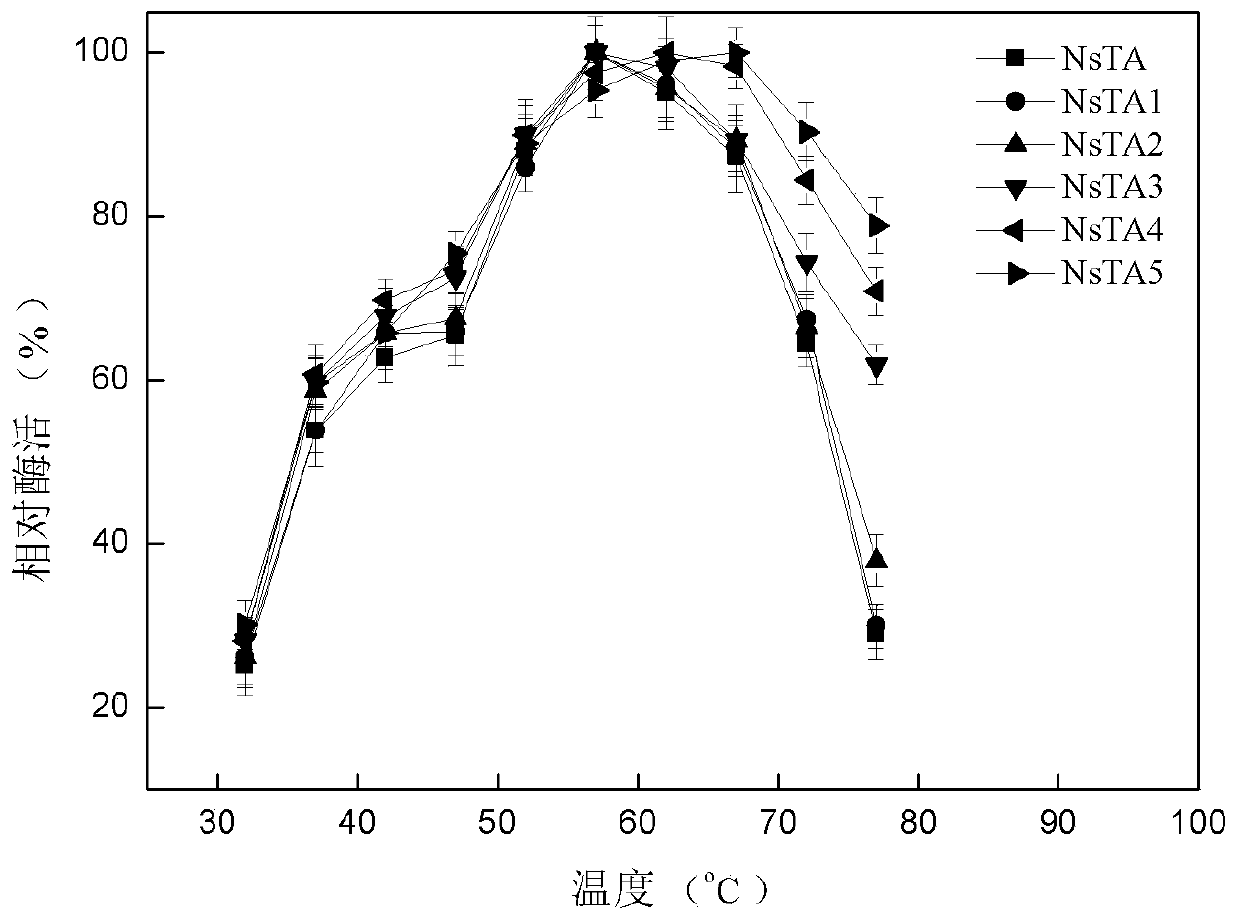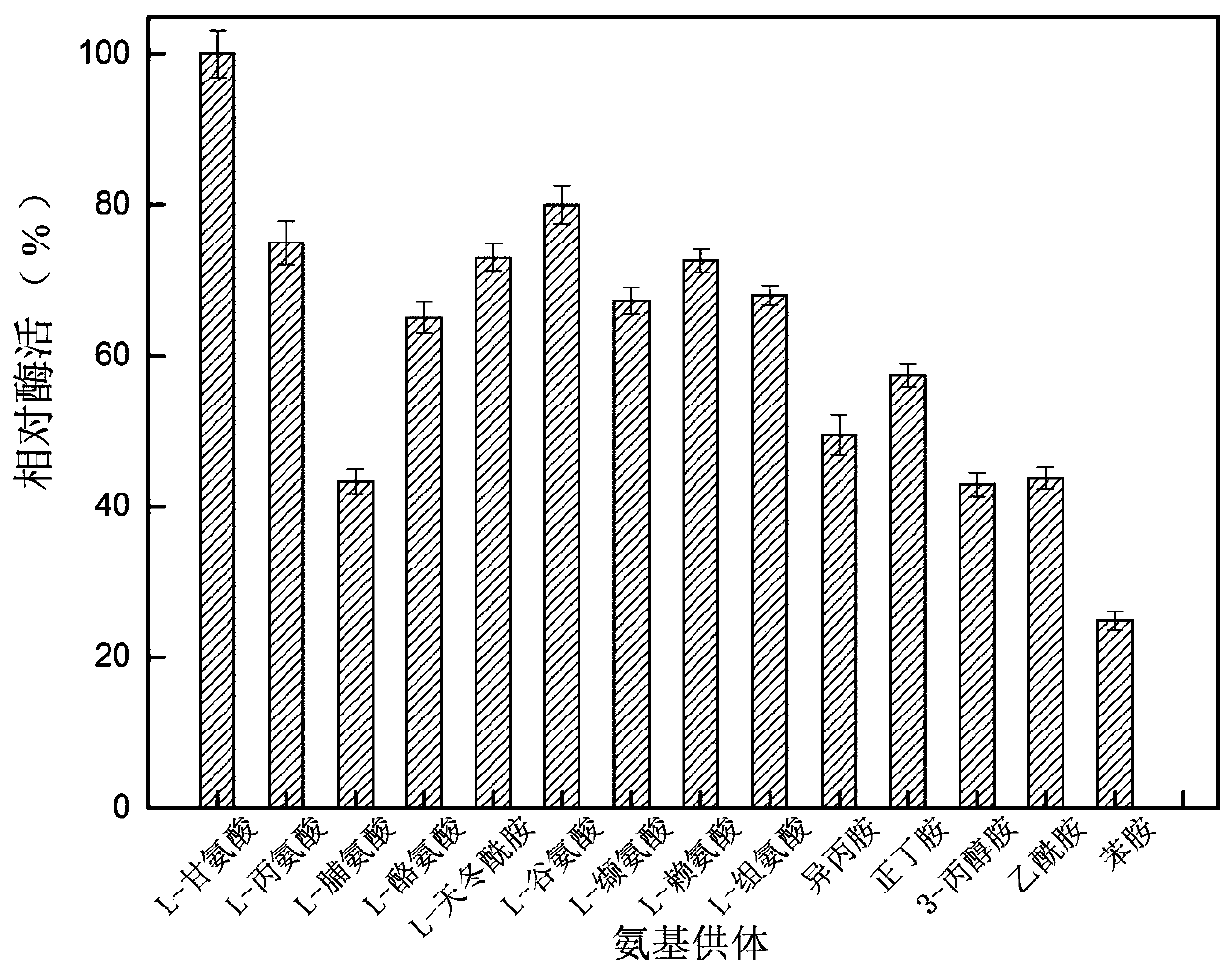α-Transaminases and mutants and their application in asymmetric synthesis of l-glufosinate
A mutant and transaminase technology, which is applied in the application field of asymmetric synthesis of L-glufosinate, can solve the problems of low product conversion rate, low enzyme activity, few enzyme sources, etc., and achieves the effect of good application prospect.
- Summary
- Abstract
- Description
- Claims
- Application Information
AI Technical Summary
Problems solved by technology
Method used
Image
Examples
Embodiment 1
[0036] Embodiment 1: Screening of novel transaminase
[0037] 1. Enzyme screening and synthesis
[0038] Through the analysis of the catalytic pocket and key residues of reported α-transaminases, three enzymes were obtained from the enzyme database, and their sources were Neisseria meningitidis serogroup B (GenBank number WP_014582472. ) and Rhizopus microsporus (GenBank accession number XP_023463024.1), and named NsTA, BiTA and RmTA. Codon optimization was carried out according to the codon preference of Escherichia coli, and three selected nucleotide sequences were synthesized by the method of total synthesis through the routine operation of genetic engineering, such as SEQ ID NO.2, SEQ ID NO.4 and SEQ ID NO.6 shown; the amino acid sequence encoding the enzyme is shown in SEQ ID NO.1, SEQ ID NO.3 and SEQ ID NO.5. Add 6×his-tag tags at the end of the nucleic acid sequence, add restriction sites Xba I and Xho I at both ends, clone the gene into the Xba I and Xho I sites corr...
Embodiment 2
[0047] Example 2: Construction and screening of NsTA single point mutants
[0048] 1. Mutant construction
[0049] Select the recombinant bacterium with the highest enzyme activity, according to the NsTA parent (the parent NsTA comes from Neisseriameningitidis serogroup B, GenBank numbering is WP_014582472.1) sequence (amino acid sequence is shown in SEQ ID NO.1, nucleotide sequence is shown in SEQ ID NO.2 Shown) to design mutation primers for site-directed mutations, using rapid PCR technology, using the recombinant vector pET28b / NsTA as a template, and introducing a single mutation at position 87, the primers are:
[0050] Forward primer GGGCGAGGCG NNK ATTGTTG (the underline is the mutant base)
[0051] reverse primer CAACAACAAT NNK CGCCTCGC (the underline is the mutated base)
[0052] PCR reaction system: 2×Phanta Max Buffer (containing Mg 2+ ) 25μL, dNTPs 10mM, forward primer 2μL, reverse primer 2μL, template DNA 1μL, Phanta Max Super-Fidelity DNA Polymerase 50U, ad...
Embodiment 3
[0066] Example 3: Construction and screening of NsTA two-site mutants
[0067] According to the single mutant NsTA1 sequence constructed in Example 2, the mutation primers for site-directed mutation were designed, using the rapid PCR technology, using the recombinant vector pET28b / NsTA1 as a template, and introducing a single mutation at the 108th position, the primers were:
[0068] Forward primer CGAAACCGCCGAC NNK TATACGCC (the underline is the mutated base)
[0069] reverse primer CTCAAAGGCGTATA NNK GTCGGCGG (the underline is the mutated base)
[0070] PCR reaction system: 2×Phanta Max Buffer (containing Mg 2+ ) 25μL, dNTPs 10mM, forward primer 2μL, reverse primer 2μL, template DNA 1μL, Phanta Max Super-Fidelity DNAPolymerase 50U, add ddH 2 0 to 50 μL.
[0071] The PCR amplification conditions were 95°C for 3min; (95°C for 15s, 50°C for 15s, 62°C for 6.5min) for 30 cycles; 72°C for 5min.
[0072] The PCR product was transformed into E.coli BL21 (DE3) competent cells...
PUM
 Login to View More
Login to View More Abstract
Description
Claims
Application Information
 Login to View More
Login to View More - R&D
- Intellectual Property
- Life Sciences
- Materials
- Tech Scout
- Unparalleled Data Quality
- Higher Quality Content
- 60% Fewer Hallucinations
Browse by: Latest US Patents, China's latest patents, Technical Efficacy Thesaurus, Application Domain, Technology Topic, Popular Technical Reports.
© 2025 PatSnap. All rights reserved.Legal|Privacy policy|Modern Slavery Act Transparency Statement|Sitemap|About US| Contact US: help@patsnap.com



